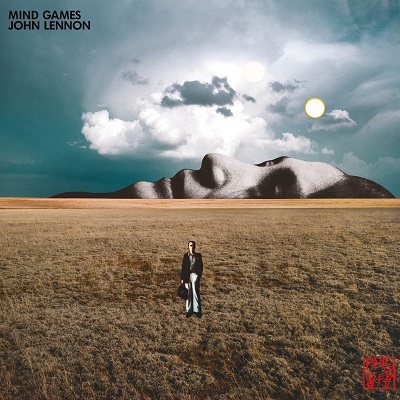There are now six different ways to hear John Lennon’s Mind Games thanks to The Ultimate Collection. Believe it or not, a half-dozen mixes reveal more than you might expect. Of course, the best way to get started is to get acquainted or reacquainted with the album, so it’s best to play through the Ultimate Mix first and sort of let it settle into your head. That way you’ll have a reference point to effectively assess the other mixes. Indeed, Mind Games – The Ultimate Collection, from the mixes to all the extra box set swag, is a huge undertaking that needs time and space to really appreciate.
After the success of Imagine, Lennon and Yoko Ono made a wild left turn in 1972 with Some Time In New York. Steeped in politics and bearing a scandalous cover, the album was slammed by critics and, without a real standout single, largely ignored by the record-buying public. Mind Games was Lennon’s attempt to regain his once mighty foothold on the charts. The album’s title track squeezed into the Top 20, and more or less put the former Beatle back on track, so to speak. And while the rest of the songs are not as popular, listeners now have the opportunity to get to know them inside and out on The Ultimate Collection.
The first disc in the set is an upgraded Ultimate Mix of the original album. Drop the needle on the opening title track, and you immediately hear a fresh, clearer, and boomier sonic thrust. Really though, the best thing about this reissue is the opportunity to revisit the album’s deeper tracks. “Aisumasen (I’m Sorry)” offers one of Lennon’s most heartfelt, thoughtful vocals. The intricacies revealed on “Bring On The Lucie (Freeda Peeple)” underscore more playfulness and swing, despite the cynicism and bite of the message. The sheer beauty, breadth, and composition of “Out The Blue,” “I Know (I Know)” and especially “You Are Here” show that Lennon, three years after the Beatles breakup, had finally come to terms with being on his own. As for “Meat City,” the album’s final song, the best thing to do is to turn it up and absorb the wordplay in a tangle of guitars and drums.
After a thorough spin through the first disc, listeners can then explore the various mixes, which cover a variety of perspectives — from totally stripped down to fully realized and everything between. John Lennon’s son Sean dissected the songs, highlighting his dad’s voice or the accompanying instrumental tracks in new and wonderous ways. In the case of “Meat City,” for example, the Elemental Mix is void of the drums, which, in turn, draws more attention to Lennon and David Spinozza’s guitars. Pull up the Elements Mix of “Out The Blue” or “One Day At A Time,” and you’ll get an earful of jazz pianist Ken Ascher’s masterful tinkling on the ivories without Lennon’s vocals.
The Evolution Documentary Mix is fairly self-descriptive in that it’s essentially demos and early takes of the songs — recorded on cassette or in the studio. Sonically bare, perhaps the most intriguing parts are when Lennon talks to the other musicians, cracking jokes or explaining how a song should go. The Raw Studio Mix sounds better, though it still illustrates the songs in development. In most cases, they’re simply other takes or arrangements. Some like “Mind Games” and “Intuition” sound unlike their final counterparts. Another disc with the appropriate title of Out-Takes comprises studio outtakes that vary in execution and semblance. As intended, these mixes provide a window into how Mind Games came together.
Mind Games (The Ultimate Collection) comes in a variety of formats — from digital and double CD and LP versions to a Deluxe box set featuring the six mixes, plus two Blu-ray Discs with Atmos, 5.1 mixes, and additional tracks. For those with deep pockets and some time on their hands, a limited Super Deluxe Edition, with only 1,100 copies printed up, is packaged in a 13-inch cube, a reproduction of Yoko Ono’s 1966 artwork Danger Box, with loads of photos, liner notes, and other goodies. It’s practically a piece of art in itself.
No matter how you slice, Mind Games (The Ultimate Collection) sheds light on one of John Lennon’s most misunderstood albums. An evening spent tracking the mixes is filled with insights and rewards. Sean Ono Lennon, with the help of renowned mixers and engineers Paul Hicks, Sam Gannon, and Rob Stevens, has done a commendable job of capturing John Lennon and The Plastic U.F.Ono Band at a time when all four Beatles were making waves as solo artists. Moreover, it serves as an ardent reminder that the early 70s was when anyone with a record deal and an innate imagination could unleash their creativity upon a world open to virtually anything.




















